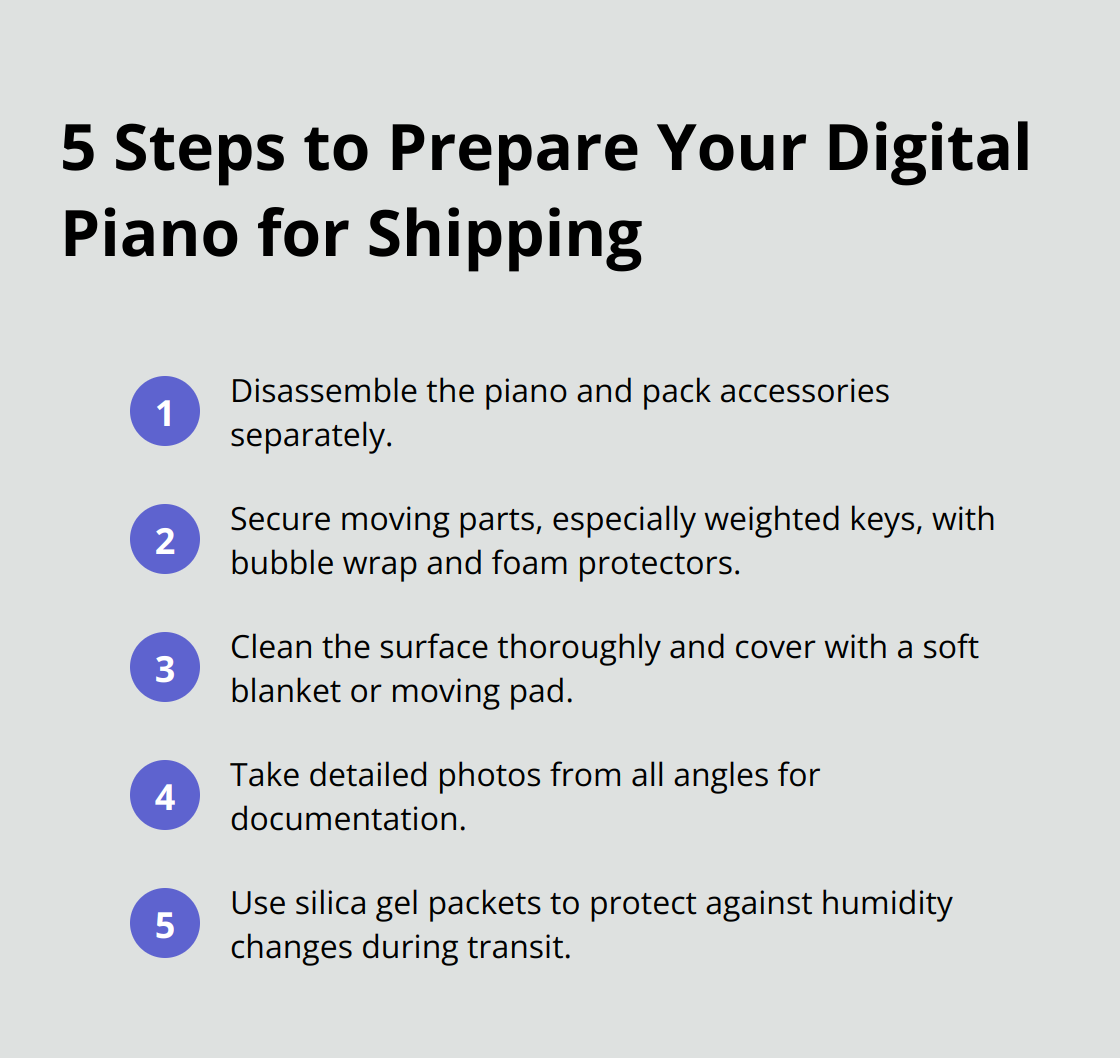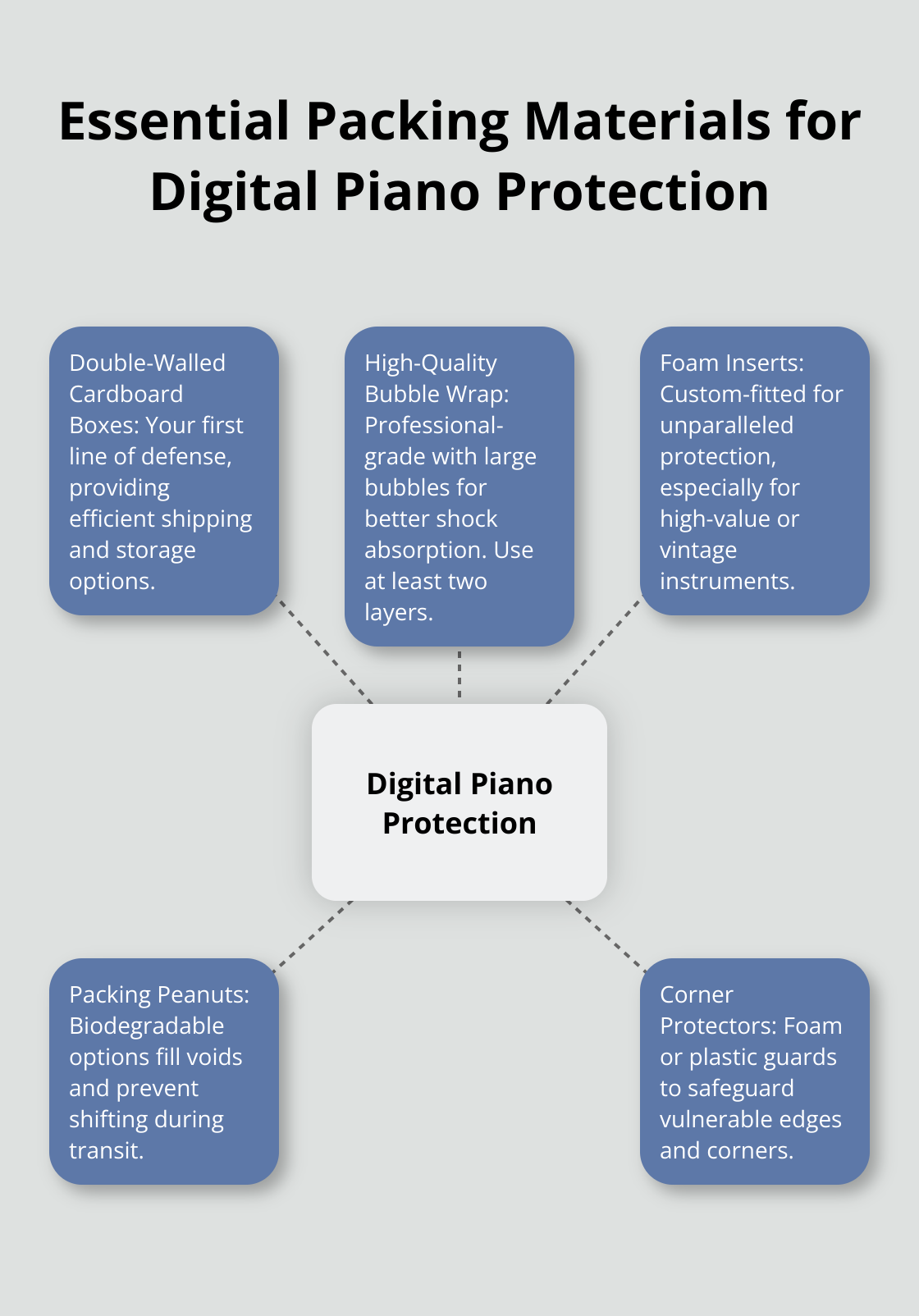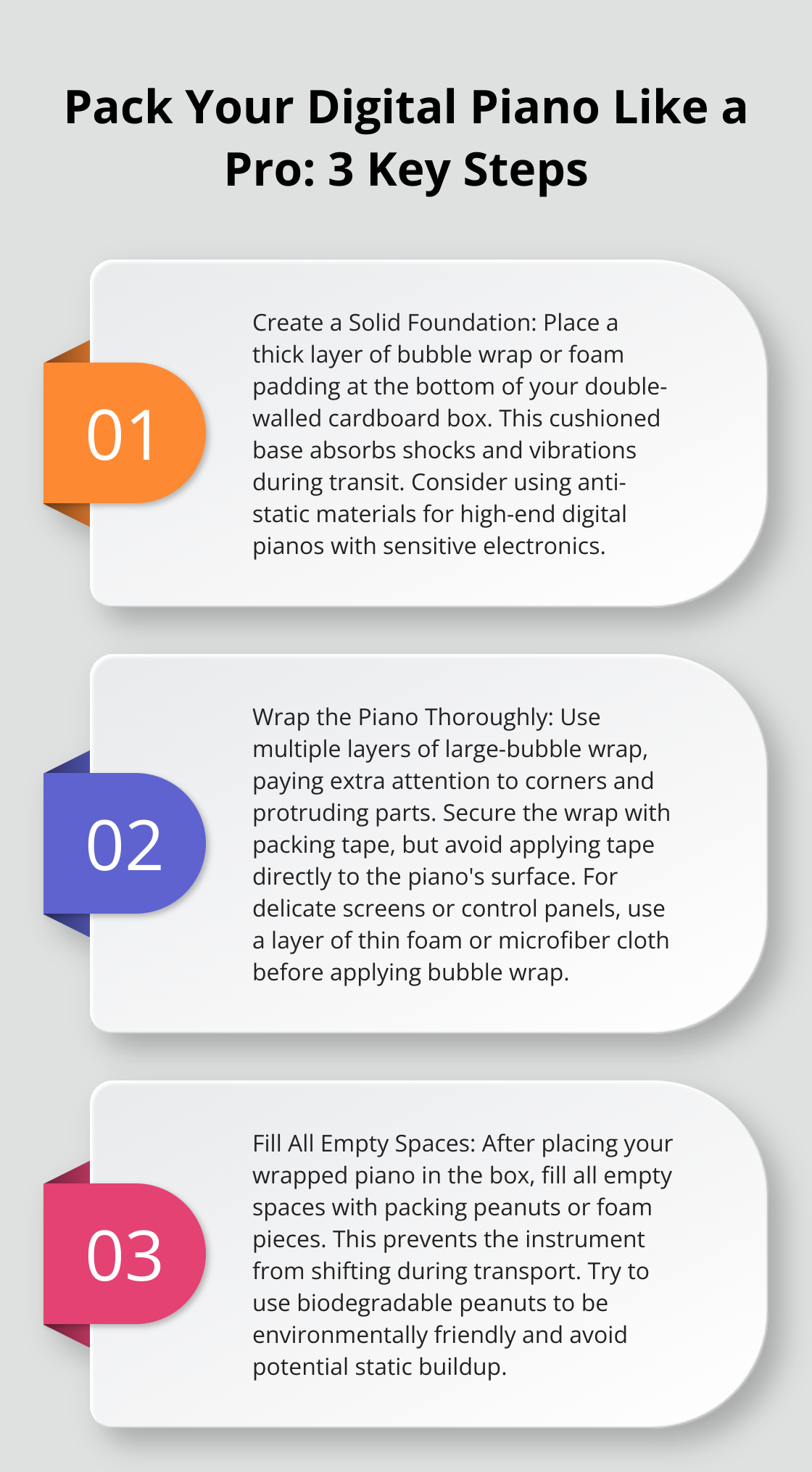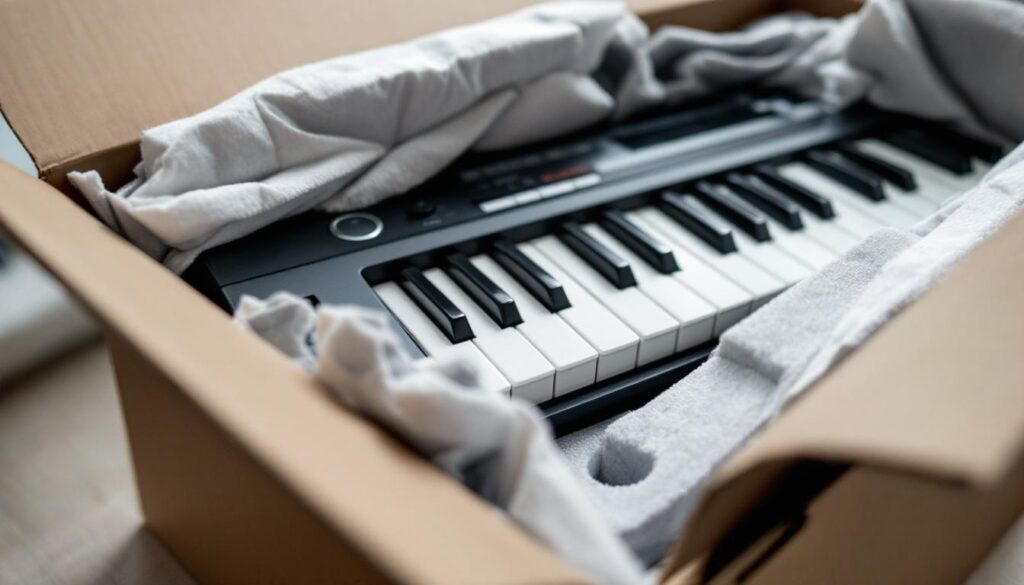Shipping a digital piano can be a daunting task, but with the right approach, it’s entirely manageable. At Southbay Moving Systems, we’ve helped countless musicians transport their instruments safely across distances.
Proper preparation and packing are key to ensuring your digital piano arrives at its destination in perfect condition. From selecting the right digital piano shipping box to using appropriate cushioning materials, every step matters in protecting your valuable instrument during transit.
How to Prepare Your Digital Piano for Shipping
Preparing your digital piano for shipping requires careful attention to detail. This process ensures your instrument arrives safely at its destination. Let’s break down the essential steps to get your digital piano ready for its journey.

Disassemble and Pack Accessories
Disassemble the piano, use bubble wrap, tape movable parts, place in a carton, wrap, add edge protection, and seal with tape. Use a stable carton for accessories. This method prevents loose items from causing damage to the piano during transit.
Secure Moving Parts
Digital pianos often feature weighted keys that can shift during transport. Wrap the keyboard in bubble wrap and use foam corner protectors to cushion vulnerable edges. Place the wrapped keyboard in a double-walled box for added protection.
Clean and Protect the Surface
Give your digital piano a thorough cleaning before packing. Use a soft, dry cloth to remove dust and fingerprints. For stubborn marks, slightly dampen the cloth with water (but be cautious not to let moisture seep into any crevices). Once clean, cover the entire piano with a soft blanket or moving pad. This extra layer protects against scratches and dings during transport.
Photograph and Document
Take clear, detailed photos of your digital piano from all angles before packing. These images serve two purposes: they provide a record of the instrument’s condition before shipping (which is important for insurance purposes), and they help you remember how to reassemble any parts you’ve removed.
Prepare for Climate Changes
If you’re shipping your digital piano to a location with a different climate, consider using silica gel packets in the packaging. These packets absorb moisture and help prevent damage from humidity changes. Place them strategically around the piano, especially near electronic components.
The next step in ensuring your digital piano’s safe journey involves selecting the right packing materials. This choice can make a significant difference in protecting your instrument from the rigors of shipping.
What Packing Materials Protect Your Digital Piano Best?
At Southbay Moving Systems, we know that selecting the right packing materials is essential for the safe transport of digital pianos. Our experience has shown that proper packaging prevents damage during transit. Let’s explore the best materials to keep your instrument safe.

Double-Walled Cardboard Boxes: Your First Line of Defense
Keyboard boxes provide efficient shipping and storage options for digital pianos. These high-quality boxes are available at wholesale prices and can be customized to fit your specific instrument. They’re perfect for protecting mechanical keyboards and similar electronic instruments during transport.
High-Quality Bubble Wrap: Cushioning That Counts
Professional-grade bubble wrap with large bubbles offers better shock absorption than small-bubble varieties. Wrap your digital piano in at least two layers, focusing on corners and protruding parts. Anti-static bubble wrap (if available) adds extra protection for electronic components.
Foam Inserts: Custom Fit for Maximum Protection
Custom-fitted foam inserts provide unparalleled protection for digital pianos. While pricier than standard packing materials, they’re worth considering for high-value or vintage instruments. Some companies offer on-demand foam packaging solutions that mold to your piano’s exact shape, eliminating movement during shipping.
Packing Peanuts: Filling the Gaps
Biodegradable packing peanuts fill voids in your shipping box and prevent the piano from shifting during transit. Choose anti-static or plant-based peanuts to avoid potential damage to electronic components (static-generating varieties can pose a risk).
Corner Protectors: Guarding Vulnerable Points
Foam corner protectors safeguard the edges of your digital piano. These inexpensive additions significantly reduce the risk of damage to vulnerable areas. For added security, try using plastic corner protectors over the foam ones.
The cost of proper packaging is minimal compared to the potential cost of repairing or replacing a damaged instrument. Now that we’ve covered the best materials for protecting your digital piano, let’s move on to the proper packing techniques that will ensure your instrument’s safe journey.
How to Pack Your Digital Piano Like a Pro
At Southbay Moving Systems, we have packed numerous digital pianos over our 30 years in the business. Our experience shows that proper packing is essential for safe transport. Here’s our step-by-step guide to pack your digital piano like a professional mover.

Create a Solid Foundation
Place a thick layer of bubble wrap or foam padding at the bottom of your double-walled cardboard box. This cushioned base absorbs shocks and vibrations during transit. For added protection, use anti-static materials if available, especially for high-end digital pianos with sensitive electronics. Rebul’s piano crate is designed for relocation and transport, with easy access, high shock absorption, strength, and flat pack for storage.
Wrap the Piano Thoroughly
Wrap your digital piano in multiple layers of large-bubble wrap. Pay extra attention to corners and protruding parts. Secure the wrap with packing tape, but avoid applying tape directly to the piano’s surface. For delicate screens or control panels, use a layer of thin foam or microfiber cloth before applying bubble wrap.
Fill All Empty Spaces
After placing your wrapped piano in the box, fill all empty spaces with packing peanuts or foam pieces. This prevents the instrument from shifting during transport. Void fills of tissue paper help items retain their shape. Try to use biodegradable peanuts to be environmentally friendly and avoid potential static buildup.
Seal and Label Carefully
Seal the box thoroughly with high-quality packing tape. Apply tape to all seams and edges, creating an H-pattern on the top and bottom for extra strength. Label the box clearly with “FRAGILE” and “HANDLE WITH CARE” on all sides. Include “THIS SIDE UP” arrows to ensure proper orientation during handling.
Control Climate Factors
If you’re shipping to a different climate, include silica gel packets in the packaging to control moisture. Place these strategically around the piano (especially near electronic components). This simple step can prevent potential damage from humidity changes during transit.
These professional packing techniques will significantly increase the chances of your digital piano arriving safely at its destination. If you’re unsure about any step in the process, don’t hesitate to reach out to professional movers. We at Southbay Moving Systems are always here to help ensure your valuable instruments are transported with the utmost care and expertise.
Final Thoughts
Shipping a digital piano requires meticulous preparation and careful execution. The right digital piano shipping box, high-quality bubble wrap, and appropriate cushioning protect your instrument during transit. Proper packing techniques, such as creating a cushioned base and filling empty spaces, further ensure its safety.
Professional assistance provides an extra layer of security for valuable or antique digital pianos. We at Southbay Moving Systems offer expert piano moving services backed by years of experience. Our team understands the intricacies of handling delicate instruments and strives to deliver your digital piano safely.
Insurance coverage for your shipment should not be overlooked. Even with the best preparation and packing, unforeseen circumstances can occur during transit. Adequate insurance (which we recommend) provides peace of mind and financial protection for your valuable instrument.




